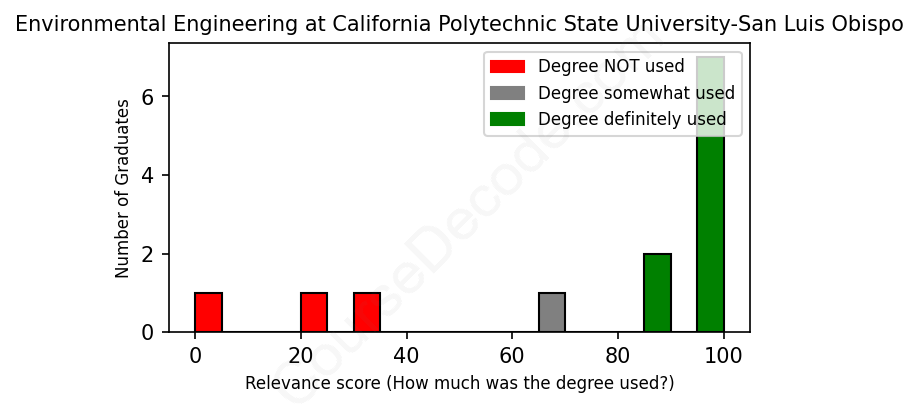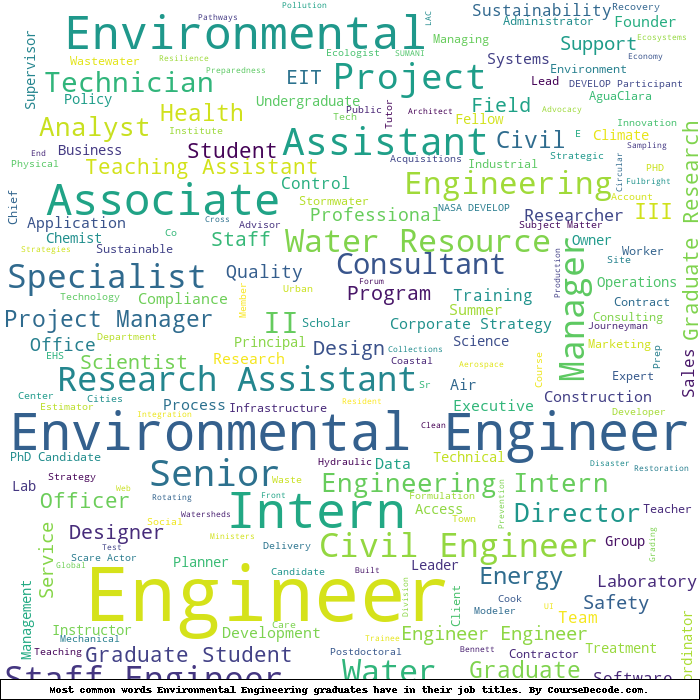
First, some facts. Of the Environmental Engineering graduates from California Polytechnic State University-San Luis Obispo we've analyzed , here's how many have used (or NOT used) their degree in their career:

These are estimates based on AI analysis of 13 LinkedIn profiles (see below).
The verdict? Above average. Overall, with an average relevance score of 76%, Environmental Engineering graduates from California Polytechnic State University-San Luis Obispo have a higher likelihood (+9%) of finding work in this field compared to the average graduate across all fields:
And for comparison, here's the chart for all profiles we've looked at across all degrees.
Also, after graduating, only 30% of these graduates have pursued further education other than another Bachelor's degree (such as a Masters degree or other), compared to the average across all profiles of 35%. This suggests a Bachelors degree is enough for most Environmental Engineering graduates, and it's normal to look for work straight after graduation.
See the details:
|
Relevance score: 100% We think this person has gone into a career highly relevant to their degree. We think this person has gone into a career highly relevant to their degree.
DEGREE INFOGraduated in 2014 from California Polytechnic State University-San Luis Obispo with a Bachelor of Science (BS) in Environmental Engineering. No other secondary education since. JOB HISTORY SINCE GRADUATIONWater Resources Engineering Intern MNS Engineers May 2014 - Jan 2015 Assistant Civil Engineer  MNS Engineers Feb 2015 - Jul 2016 Associate Civil Engineer  MNS Engineers Jul 2016 - Jun 2018 Project Engineer  MNS Engineers Jun 2018 - Dec 2020 Senior Project Engineer  MNS Engineers Jan 2021 - Sep 2021 ABOUTBlending a degree in Environmental Engineering with real-world Civil Engineering principles and practices to provide engineering support for a wide range of water resources projects, including water line and sewer line replacement; water and wastewater treatment improvements; recycled water; storm water runoff; pumps, tanks, and reservoirs; and planning and modeling. Proficient in AutoCAD Civil 3D and knowledgeable in ArcMap, WaterCAD, and HEC-RAS. Experience in all phases of a project, from inception and preliminary design to final design, construction-phase services, and construction inspection. |
The top 10 most common jobs done by the graduates we've analyzed (ranked most common to least) are:
The most common types of jobs for graduates from Environmental Engineering at California Polytechnic State University-San Luis Obispo generally fall within the realms of engineering roles that focus on environmental protection, water resource management, and compliance with environmental regulations. You can see that many graduates progress to specific engineering positions such as Water Resources Engineer or Environmental Engineer, which directly apply their academic knowledge in practical settings. Companies like Chevron and various governmental agencies (like the State Water Resources Control Board) seem to hire quite a few grads, showing a strong pathway for those wanting to stay within their field. There are also positions like Associate Engineer or Project Engineer, where the focus remains on environmental-related projects, making them highly relevant. However, not all roles listed are directly tied to environmental engineering. Several individuals have branched out into unrelated fields like IT consultancy, finance, or general engineering roles that don’t specifically leverage their environmental engineering skills and knowledge. Positions such as IT Consultant or roles in investment banking illustrate this departure from their core field of study. Overall, while many graduates pursue jobs that align closely with environmental engineering principles, there’s a notable subset of alumni who explore diverse roles, which might dilute the relevance of their degree in those cases.
Here is a visual representation of the most common words in job titles for Environmental Engineering graduates (this is across all Environmental Engineering graduates we've analyzed, not just those who went to California Polytechnic State University-San Luis Obispo):

Looking at the career trajectories of graduates from California Polytechnic State University-San Luis Obispo who majored in Environmental Engineering, it's pretty clear that many of them are finding solid jobs related to their field right after graduation. Most graduates seem to start out in internships or entry-level positions that tie directly into environmental engineering, like laboratory technicians, engineering interns, or project engineers. Companies like Chevron and various engineering firms appear to frequently hire these grads, and it's awesome to see them kick off their careers with roles that are undoubtedly relevant to their studies.
Fast forward 5 to 10 years after graduation, and it looks like many of these individuals have successfully climbed the career ladder. A good number of them are now in senior roles or even project management positions, often continuing to work within the water resources and environmental engineering sectors. Some have advanced to roles like Environmental Engineer or Water Resources Engineer at reputable organizations. While a few have ventured into other fields, such as IT or investment banking, those instances seem less common. Overall, the alumni network demonstrates a strong trend towards fruitful careers that leverage their Environmental Engineering degrees, which is pretty encouraging for anyone considering this path!
Getting a Bachelor’s degree in Environmental Engineering at Cal Poly San Luis Obispo can be pretty challenging, but it’s definitely manageable if you’re passionate about the subject. The program has a solid reputation and involves a lot of coursework in math, science, and engineering principles, so be ready to hit the books and do some serious problem-solving. There’s also a hands-on component with labs and projects, which can make things more engaging but also adds to the workload. It’s not the easiest degree out there, but if you’re interested in making a difference in the environment, the effort can feel totally worth it! Just be prepared to stay organized and maybe make a few late-night study sessions your new best friends.
Most commonly, in the LinkedIn profiles we've looked at, it takes people 4 years to finish a Bachelor degree in Environmental Engineering.
It looks like these Environmental Engineering graduates from Cal Poly SLO have had a pretty diverse range of jobs, which is cool because it shows there are different paths you can take in this field. Many have secured roles with some decent titles and responsibilities, particularly those who stuck it out in engineering positions or found their way into consulting—this often leads to a solid paycheck. For example, the folks who graduated in 2013 and 2014 seem to be well-established at companies like Chevron and state agencies, which typically offer good salaries and benefits. However, some of the earlier positions, like internships, wouldn't have paid that well. Overall, it seems like most of these grads have likely landed decent money, especially as they gain experience, but it can definitely vary based on the specific roles and companies they chose.
Here is a visual representation of the most common words seen in the "about" section of LinkedIn profiles who have a Bachelor degree in Environmental Engineering (this is across all Environmental Engineering graduates we've analyzed, not just those who went to California Polytechnic State University-San Luis Obispo). This may or may not be useful:

Here are all colleges offering a Bachelor degree in Environmental Engineering (ordered by the average relevance score of their Environmental Engineering graduates, best to worst) where we have analyzed at least 10 of their graduates:
| College | Score | Count |
|---|---|---|
 California Polytechnic State University-San Luis Obispo California Polytechnic State University-San Luis Obispo
|
76 | 13 |